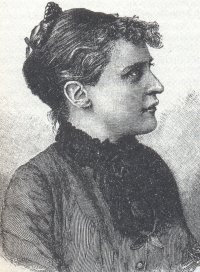
CROATIAN WOMEN PHILOSOPHERS
Authors: Luka Boršić, Ivana Skuhala Karasman [Introduction] [Bibliography] [The list of works]

Authors: Luka Boršić, Ivana Skuhala Karasman [Introduction] [Bibliography] [The list of works]

DRUSKOWITZ, von, Helene (Hietzing, Austria, 1856 – Mauer-Öhling, Austria, 1918), philosopher, writer, feminist.
She was born as Helena Maria Druschkovisch. After having graduated from the Musical Conservatory in Vienna (the piano) in 1874, she moved with her mother to Zurich, where she studied Philosophy, Archeology, German linguistics, and Oriental Studies. When she was 22 she received her PhD with a thesis Don Juan in Lord Byron which made her the second German-speaking women to receive a PhD title. She taught history and literature in several universities, as well as gave lectures in numerous institution of higher education in Germany, France, Spain and Italy. In 1881 she met the Austrian writer Marie von Ebner-Eschenbach (1830 – 1916) and became a member of her literary circle. During this period she was actively engaged in literary activities which included also Reiner Maria Rilke (1875 – 1926) and the Russian psychoanalyst and writer Lou Andreas Salomé (1861 – 1937). In 1884 she met Friedrich Nietzsche in Zurich, and this meeting made a considerable impact on her philosophical production. Her areas of philosophical interests included Kant, Schopenhauer and H. Spencer. She used the pseudonyms Adalbert Brunn, H. Foreign. (Frl.), Erna (von Calagis), E. (von) René, and H. Sackorausch. She edited magazines which were focused on the emancipation of women, Der heilige Kampf and Der Fehderuf. After her mother’s death in 1888, she started consuming ever more alcoholic drinks and drugs, and after the breakup with her year-long partner, the soprano Theresa Malten (1855 –1930), she experienced an existential crisis and a breakdown. She died in the psychiatric clinic in Mauer-Öhling in Austria.
WORKS: Percy Bysshe Shelley, Berlin, 1884.; Drei englische Dichterinnen: Essay, Berlin, 1885.; Moderne Versuche eines Religionsersatzes: ein philosophischer Essay, Heidelberg, 1886.; Wie ist Verantwortung und Zurechnung ohne Annahme der Willensfreiheit möglich? Eine Untersuchung, Heidelberg, 1887.; Zur Begründung einer überreligiösen Weltanschauung, Heidelberg, 1889.; Eugen Dühring. Eine Studie zu seiner Würdigung, Heidelberg, 1889.; Pessimistische Kardinalsätze, Wittenberg, 1905.; Der Mann als logische und sittliche Unmöglichkeit und als Fluch der Welt. Pessimistische Kardinalsätze, Freiburg, 1988.